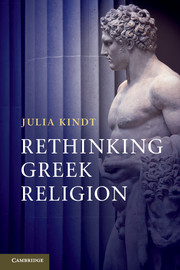Book contents
- Frontmatter
- Contents
- List of Figures
- Acknowledgements
- List of Abbreviations
- Introduction
- Chapter 1 Beyond the polis: rethinking Greek Religion
- Chapter 2 Parmeniscus’ journey: tracing religious visuality in word and wood
- Chapter 3 On tyrant property turned ritual object: political power and sacred symbols in ancient Greece and in social anthropology
- Chapter 4 Rethinking boundaries: the place of magic in the religious culture of ancient Greece
- Chapter 5 The ‘local’ and the ‘universal’ reconsidered: Olympia, dedications and the religious culture of ancient Greece
- Chapter 6 ‘The sex appeal of the inorganic’: seeing, touching and knowing the divine during the Second Sophistic
- Conclusion
- Bibliography
- Index
Chapter 1 - Beyond the polis: rethinking Greek Religion
Published online by Cambridge University Press: 05 August 2012
- Frontmatter
- Contents
- List of Figures
- Acknowledgements
- List of Abbreviations
- Introduction
- Chapter 1 Beyond the polis: rethinking Greek Religion
- Chapter 2 Parmeniscus’ journey: tracing religious visuality in word and wood
- Chapter 3 On tyrant property turned ritual object: political power and sacred symbols in ancient Greece and in social anthropology
- Chapter 4 Rethinking boundaries: the place of magic in the religious culture of ancient Greece
- Chapter 5 The ‘local’ and the ‘universal’ reconsidered: Olympia, dedications and the religious culture of ancient Greece
- Chapter 6 ‘The sex appeal of the inorganic’: seeing, touching and knowing the divine during the Second Sophistic
- Conclusion
- Bibliography
- Index
Summary
Because the polis is most cherished and the real religion of the Greeks, the battles for her also have the force and terror of religious wars and every break with her fundamentally uproots the individual.
Jacob BurckhardtINTRODUCTION
An inquiry into ancient Greek religion beyond polis religion necessarily starts from the question of what we mean by polis religion and the impact of this model on how we conceive of ancient Greek religion as a field of study. In current scholarship, particularly in the Anglo-American and Francophone worlds, polis religion has become a powerful interpretative model for the study of Greek religion. The model is now sufficiently well established that we need to explore its implications as well as the alternatives that complement or move beyond it. Surprisingly, however, the implications of the model are rarely discussed in the study of ancient Greek religion. There is no single account that directly and comprehensively responds to Sourvinou-Inwood's two methodological articles on polis religion – the most explicit conceptual formulation of the model.
This chapter offers a critical evaluation of where we stand. It identifies key problems in the scholarly use of the polis-religion model and examines how individual scholars have positioned their work in regard to these issues. Rather than rejecting the model outright, the chapter aims to move the debates forward by exploring its scope and limits. It examines polis religion in its different forms and formulations and discusses the ways in which some scholars have recently sought to overcome the ‘polis orientation’ implicit in large parts of the work done in this field.
- Type
- Chapter
- Information
- Rethinking Greek Religion , pp. 12 - 35Publisher: Cambridge University PressPrint publication year: 2012
- 1
- Cited by



